Undergraduate students majoring in mathematics
A Celebration of Cornell Undergraduate Mathematics Majors
This page celebrates undergraduate study in mathematics at Cornell. Many thanks to our recent former students who shared their stories, achievements and advice with us.
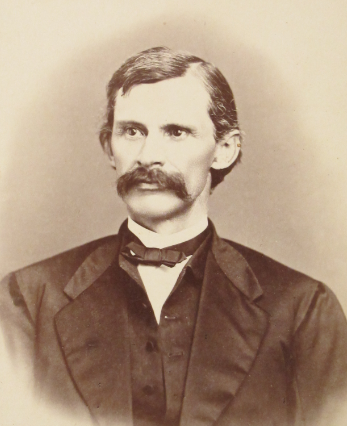
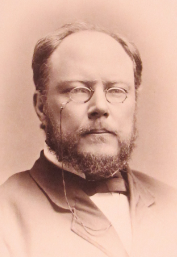
Over 400 undergraduate students enrolled at Cornell on its opening year in 1868. At the time, it was the largest entering class ever in the history of higher education in the United States. Evans Wilhelm Evans (far left) taught mathematics, assisted by Ziba Potter (left). A Cornell graduate, A. W. S. '78, writes in the Cornell Alumni News of October 23, 1930: In 1874-75, I studied elementary mathematics in White Hall with Professor Ziba Hazard Potter. He was an excellent teacher, a man of fine human sympathy, and a lover of a joke. One day in class he spoke of the impossibility of squaring a circle. Then he said: "If you should hear of anybody trying to square a circle, tell him you have a better job for him; ask him how much he would charge a day to throw feathers over a barn." All my life this has been my standard of futility.
The Cornell class of 2018 enrolled 3,261 students chosen from over 43,000 applicants. In recent years, mathematics is taught by over 40 faculty assisted by more than 60 graduate students. About 6,000 undergraduates enroll annually in mathematics courses and about 50 students graduate each year with a mathematics major. One thing that has remained constant over the 150 years history of the department is the diversity of the interests and career choices of our mathematics majors, a diversity that has been encouraged and supported by the department throughout the years.
Louisa Schwartz '14

Louisa moved to Wisconsin in August 2014 to work as a Business Intelligence Developer at Epic and hopes to get an MBA in a few years. She says I loved math since sixth grade. Furthermore, I thought a degree in math would make it easy for me to get a job after college (and I was right!). Professor Tara Holm taught me linear algebra, and made it really accessible, interesting, and fun. I would advise future Cornell mathematicians to not be intimidated in upper level math classes. It might seem like other people have a perfectly clear grasp on the material, but if you find it hard, chances are that other people also find it hard.
Elisabeth Cai '12

Elisabeth is a graduate student in Finance at the Wharton School at University of Pennsylvania. She will move from academia to industry after completing her MA in finance. She says Cornell is unique in that they offer such a diverse set of fields compared to other universities and the campus is gorgeous... I have always loved math because of its irrefutable nature and elegance... My advice to future Cornell mathematicians is to take advantage of the many different and creative courses offered. Explore all the fields of math to find your favorites. Get to know your professors! They're brilliant and will inspire you beyond your coursework.
Nina Naydenova '10
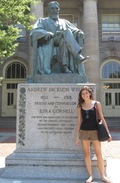
I have been living in Manhattan and working in investment banking at J.P. Morgan. I spent my first three years in the Financial Institutions Group, working with exchanges, broker dealers and financial technology companies. I am now in the Mergers & Acquisitions Group. Outside of work, I love to travel (I've visited over 25 countries and this year have been to Germany, France, Morocco, Hungary). Among the many reasons I came to Cornell are the beautiful campus and the large school with a wide variety of course offerings. I knew I wanted to study Mathematics as my major but work in finance. Cornell allowed me to do both - major in math but also take electives in the AEM program and the Johnson School of Business. Study what you enjoy. Regardless of your career, math will teach you a way of thinking that can be applied to anything you chose.
Miles Wheeler '09

In the fall after my senior year at Cornell I started the math Ph.D. program at Brown University. In 2011 I started working on water waves with my thesis advisor Walter Strauss, and my first article in this area was published in 2013. I graduated from Brown in May 2014; next year I will be an NSF postdoc at NYU. At Cornell, Math 223 and 224 (Theoretical Linear Algebra and Calculus), which I took in my freshman year 2005, made a huge impression on me. The course was so much faster, more abstract, and more difficult than anything I'd seen in high school. It was exciting without being too overwhelming, thanks in no small part to the kindness and enthusiasm of the instructor Todd Kemp and teaching assistants Joshua Bowman and Gwyneth Whieldon. I especially enjoyed getting to know and working with the other students during the evening sections in the math lounge.
Michael Barany '08
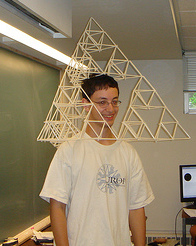
As I approach the end of my PhD in Princeton's Program in History of Science, my research is solidly in the field of history. But it relies centrally on my mathematics education from Cornell. One of my first appointments after arriving on campus for my freshman year was to meet Professor Strichartz in his "outdoor office," which consisted of a pair of folding chairs just off the path through the A.D. White Garden, which sat between the Math Department and the headquarters of the Society for the Humanities. The main purpose of my meeting with Professor Strichartz was to talk about taking his graduate course in real analysis that semester, which I ended up taking (along with its complex analysis counterpart) alongside the demanding honors undergraduate algebra sequence taught by Professors Sjamaar and Dennis that year, after winning the consent of my freshman advisor—who happened to be John Hubbard—in part by solving a few math problems in his office. Some induction to college! That year of math classes was definitely challenging, but I was glad to be in a supportive department willing to let me try.
Zachary Scherr '07

Zachary entered Cornell as a student in Engineering, but after an exiting summer program at the Ohio State University before his freshman year, he decided that mathematics was his calling and transferred to the College of Arts and Sciences to double major in Mathematics and computer sciences. At Cornell he was a T.A. for the computer science department, played in the orchestra, and participated in the bowling club. He tells the following anecdote: At some point I took the graduate algebraic topology class. We were using Hatcher’s book and I had taken point set topology from Hatcher in a previous term. I was really struggling on one of the problems from his book, so I decided to ask him for some help. I showed up at his office and told him the problem. He and I spent some time working it out together, and at the end of our meeting he exclaimed that this was a really great problem since it brought together a few different concepts in a clever way. I love telling this story since to this day I’m not sure if he realized that this problem, which he doted on, was a problem right out of his own book. After leaving Cornell Zach went to the University of Michigan for graduate school. I spent six years there and loved every minute of my time. There I did my dissertation with Michael Zieve in arithmetic geometry and algebraic number theory. I am currently going into my second year of postdoc at the University of Pennsylvania where I work with Ted Chinburg. I think Cornell prepared me very well to succeed in graduate school.
Tom Church '06

After graduating summa come laude from Cornell, Tom studied mathematics at the University of Chicago with another Cornell graduate, Benson Farb '89. Tom obtained his Ph.D. in 2011. He is Assistant Professor at Stanford University. His research is in topology, especially low-dimensional topology, and he often uses representation theory. He is especially interested in moduli spaces, broadly defined. He is the recipient of an NSF CAREER award.
Michelle Fullwood '04
I came to Cornell already knowing I wanted to study math. Ravi Ramakrishna's first-year courses Math 223 and Math 224 confirmed that it was the right choice for me as I loved his classes. I also had a great time doing a semester of study abroad with Budapest Semesters in Mathematics in my junior year (and encourage future Cornell math students to do it too). I am now a grad student in linguistics at MIT. I feel like it's doing many of the things I love about math - spotting patterns, formalizing them into a system - but doing them with languages, which I love working with. I also use a lot of math while doing programming and in understanding machine learning algorithms, which I have been doing a lot of recently. So having studied math has been a great asset to me, even if I am not a "mathematician" today. Besides all that, I also met my boyfriend, now husband, Greg Padowski '03 (M.Eng. '04) through math. We happened to both be in the study lounge at our dorm. We were both rather shy and might not have talked, if he hadn't spotted a possible topic of mutual interest: I was working on Hoffman and Kunze, the assigned textbook for Math 433 with Keith Dennis; he had taken the course in his freshman year. So we got to talking about that, wound up dating six months later, and we were married in 2007. Thank you, Professor Dennis, for not changing textbooks!
Ryan Williams '01
After earning his Ph.D. in computer science at Carnegie Mellon in 2007, Ryan is Assistant Professor in computer science at Stanford University. To the question "Why Mathematics?" he answers: Why not? :) It's always a good question. The real world is full of vagueness, uncertainty, gray areas. Mathematics reminds me that another beautiful world exists, where we can know and discover absolute truth. And the ways we can discover this truth are always astounding. Yes, what we do in mathematics obviously has bearing on the real world (and vice-versa), but it's important to remember these wonderful properties of mathematics that much of reality does not possess. Don't be shy: talk to your professors and TAs in office hours, every chance you get. If you're interested in mathematics, talk to people who took this path: it will help you understand if it's a good path for you. And talk to your classmates! Get to know them, and learn from them. They are also a fountain of knowledge.
Sarah (Knapp) Abramowitz '89

Sarah has a Ph.D. in mathematics education from NYU and sepcialized in educational statistics. She is professor at Drew University, a small liberal arts college in New Jersey. Recently, she and a colleague have been investigating using a flipped approach to teaching introductory statistics. Her father, Anthony Knapp, was a professor of mathematics of Cornell. About Cornell, she writes I was a fan of Big Red Hockey, especially because I'm from Ithaca and I used to babysit Brian McCutcheon's (the coach) kids. I met my husband, David, who is also a math major from '89 in probability class and discovered that we had a mutual interest in Cornell hockey. Now, living in Brooklyn, we take our children (Michelle and Scott) to see the team play in Madison Square Garden. I also worked as an usher at Barnes Hall and enjoyed listening to the vast array of concert music there. I was married in Annabel Taylor Hall and we had our wedding reception at the Statler Hotel.
Ravi Ramakrishna '88
Ravi is Professor of Mathematics at Cornell. He says his favorite math class at Cornell was 413-414 with Tony Knapp - the guy wrote a perfect textbook on the board at light speed...at 8:40am. After studying with Andrew Wiles at Princeton for his Ph.D., he held postdoctoral positions at Chicago and Yale before returning to Cornell. His advice: Talk to your professors! Even if you don't have questions about the homework. They know a ton...and you're paying their salaries!
Will Glaser '87

Will is one of the cofounders of Pandora, the leading provider of online radio, with over 200 million registered users, and accounting for 8% of all radio listening nationwide. He currently operates a consulting practice specializing in business startups, new product architectures, and high technology turn-arounds. He writes Mathematics is the secret behind how everything works. We all know that it's the foundation upon which physics, engineering, and the many miracles of modern technology are built. What might be less obvious is that many other disciplines work better when the underlying mathematics is solid. These include economics, politics, agriculture, medicine, finance, business, etc. Just like building a house is easier with good tools and looking at the stars is better with a good instrument, many professional pursuits are improved with an appropriate knowledge and application of math. The success of Pandora was due in no small part to creating the Music Genome Project and solving the big math problem that is individual musical taste. I was able to craft those solutions as a direct result of the mathematics training that I got at Cornell.
Denise Freed '86
Denise is a Research Scientist at Schlumberger-Doll. She writes Although I loved doing math and the type of thinking involved in coming up with proofs, there were many more things I was still curious about learning in physics than in math. I applied to both math and physics graduate programs, but, in the end, chose physics both because I was more compelled to learn more in the area and because I felt I could still do some sort of math while doing physics. While at Cornell, I was also very concerned about how I could have both a career and a family. Some of my concerns were allayed when I saw Birgit Speh and Melanie Stein (a graduate student) bring their babies into White Hall. Birgit Speh would keep her baby in her office with her and get work done while the baby was sleeping. I decided that it did look possible to have a career and kids, but that, to make it work, I should probably be a theorist, and not an experimentalist. I am now a research scientist at Schlumberger-Doll research, where I try to come up with new measurements and ways of interpreting measurements for oil exploration. I am very lucky that I have found a niche where I can do fairly basic research that also leads directly to useful applications for oil exploration. In addition, I use some form of math (including complex analysis) almost every day at work.
Lance Fortnow '85

Lance is a Mathematician/Computer Scientist and Author. He has a Ph.D. in Applied Mathematics from MIT and is the author of "The Golden Ticket: P, NP and the Search for the Impossible". His advice: Take advantage of the many great courses at Cornell both in math and the great diversity of other topics at the University. Math is at the heart of much of today technological revolutions such as web search and machine learning. Have a strong math background and you will have a great advantage in whatever career you pursue.
Jeffrey Lehman '77

Jeffrey served as the eleventh President of Cornell. I was drawn to Cornell initially because I grew up hearing about Cornell from my father, who graduated in 1949. Long before I ever visited the campus, Cornell symbolized what a college education was supposed to be. Math was my favorite subject as a child, full of unexpected delights (I still remember the sense of wonder I had when, in elementary school, I "discovered" that the sum of consecutive integers was always equal to the difference between their squares). I knew I wanted to be a math major long before I reached West Hill! My career since graduation has been a delightful journey. I have had the chance to wander from math to law and public policy, out into the "real world" and then back to the academy as a professor, and then on to a series of positions in university administration that of course included Cornell's presidency. The curiosity that Cornell nurtured in me has allowed me to live in the U.S. and France and now China, working with an astonishing assortment of interesting people. My advice to Cornell math majors is to drink deeply from all that the department has to offer, while making sure that you also sample widely from the rest of the university. (For me, I had to push the department to let me spend my junior year studying in France, but that year proved to be a life-changing experience for me.).
Joseph Glover '74

Joseph is currently Provost of the University of Florida. In this capacity, I help guide and manage the academic endeavors of the university and interactions among over 100 disciplines. I also get to participate in the national conversation about the future of higher education, which is undergoing rapid change and evolution. From my undergraduate years, I remember fondly year-long courses in analysis from Leonard Gross, algebra from Keith Dennis, a course in mathematical methods for physics from Frank Spitzer, and the graduate course in probability from Kiyosi Ito. I found probability to be weird and fascinating and subsequently pursued graduate work in stochastic processes. My advice for future Cornell mathematicians: if you're talented enough to graduate from Cornell with a degree in mathematics, you're talented enough to do just about anything. But it requires you keep an open mind to opportunities that may come your way. While the technical and computational skills of a mathematician are valuable in technical environments, the analytical and critical thinking skills developed in a mathematics major will serve you well in every task you undertake. You will probably reinvent yourself and your career several times over the course of your working life, and I wager you will find your mathematical underpinnings to be tremendously valuable in every context.
Stephen Lisberger '71
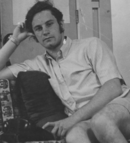
I grew up in Ithaca and knew that I would enjoy the campus atmosphere. Cornell had a work-hard, play-hard feeling in the 60's, something that I know from my daughter's experience (Cornell '16, physics) hasn't changed. My years at Cornell were in a time of political evolution in the US. We learned more from the campus upheaval surrounding African-American affairs, the War in Vietnam, and the shootings at Kent State than we did in our classes... I went to graduate school in neuroscience and have had a very successful career studying how the brain works while it is working. I spent 31 years as a faculty member at the University of California at San Francisco and recently moved to Duke University to become the Chair of the Department of Neurobiology. In my research, I have profited from the analytical background provided by math, and many of my publications include either theoretical models or computer simulations.
Sharon Weinberg '68
Sharon is Professor of Applied Statistics and Psychology at NYU. I always loved math and problem solving, and knew early on that I would want to major in mathematics in college. Professor Jack Kiefer was highly influential for me. I took his class on statistics when I was a senior and knew, based on his course, that statistics was an area that I wanted to pursue in graduate school. I was fortunate upon graduation from Cornell in 1968 with an A.B. in mathematics to be accepted with a fellowship to Cornell’s graduate school from which I earned a Ph.D. in 1971 in psychometrics and research design methodology. Upon graduation, I joined the faculty of New York University, where I am now Professor of Applied Statistics and Psychology... I am married to Steven K. Weinberg, a ’68 Cornell engineer who also holds law and business degrees from Cornell. We met as Cornell undergraduates during the summer after our freshman year... Given the vast amounts of data being generated in this digital age, there is an ever- growing need for individuals with skills in automated methods that can be used to extract information from big data. I would urge future Cornell mathematicians to avail themselves of the many faculty on campus, whether from the math, computer science, or related departments, who are experts in some aspect(s) of data science, so that they too may one day contribute to this growing and important field.
Stephen Gelbart '67
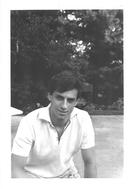
After attending graduate school at Princeton, Stephen returned to Cornell where he was a Professor for ten years. He held visiting positions at the Institute for Advanced Study and in Jerusalem. Stephen is now a Professor at the Weizmann Institute of Science in Israel. For the first 19 years of my life, I never thought seriously about what I would be when I grew up. But between sophomore and junior years at Cornell, my father and I drove from New York City to Syracuse, and the conversation that took place between us had a dramatic effect on my life. As we were crossing the George Washington Bridge, I nonchalantly asked my father about transfinite numbers which I happened to have read about that day in the magazine 'Scientific American'. My father (who was himself a mathematician) answered me slowly with Cantor's definition about infinite sets; by the time we reached our destination, I had been led through a course in real variables including the Heine-Borel theorem! I was completely sold on mathematics! So for junior year I switched my major to Math (from Physics), and never looked back again.
Paul Wolfowitz '65
The son of Cornell Mathematics Professor Jacob Wolfowitz, the younger Wolfowitz double majored in mathematics and chemistry before earning a Ph.D. in Political Science from the University of Chicago and entering politics. Perhaps most famous for his tenure as Deputy Secretary of Defense under George W. Bush and his involvement in the Iraq war, Wolfowitz has also served as Under Secretary of Defense under George H.W. Bush and President of the World Bank Group. He is currently a Scholar at the American Enterprise Institute.
Nancy Kopell '63

Nancy is Mathematician and Neuroscientist at Boston University. I wanted to go to an excellent co-ed school, and I had a NY State scholarship. Of course, once I was there I saw the many virtues of Cornell, but I did not do the kind of research that students do now... . I went to graduate school (UC Berkeley) during the days of the Free Speech Movement (1963- 1967), engendering a large culture shock. (At Cornell, we still dressed for lunch on Sundays and sang the Alma Mater before eating.) I had my first job at MIT as a C.L.E. Moore Instructor, the first woman to have that position (with all the awkwardness that came along with that). I worked at Northeastern University after that, and since 1986 have been at Boston University. Over that period of time, my career has taken directions that I would not have imagined: I became a neuroscientist, working on brain dynamics and its relationship to cognition, (Yes, the work uses math).
Donald Kahn '57

From a 2010 interview (http://www.math.umn.edu/newsletter/2010/) "Don's undergraduate education took place at Cornell, which was something of a tradition for Don's extended family. He initially thought in terms of a physics major, and took Hans Bethe's quantum mechanics course. Bethe was a very impressive scientist, who eventually was awarded the Nobel Prize. He was also a fearless calculator, who needed no notes for lectures and had many powerful mathematical tools in his head. But he seemed to have a rather hostile view of mathematics as a discipline, and ruthlessly trampled on some of the subtleties of math that Don was already able to savor. So in the end he turned away from the dark side of the force, and became a math major. Don also met his future wife Phyllis at Cornell, and they graduated in the same year." Don and Phyllis did their graduate study at Yale.He received his Ph.D. thesis in topology with William Massey in 1961. She earned her Ph.D. in biophysics and has become a long serving member of the Minnesota House of Representatives. Don became Professor of Mathematics at the University of Minnesota. He loved music and photography. He passed away January 16 2015.
Jerome Sacks '52
Jerome Sacks graduated from Cornell, with a 1952 B.A. and a 1956 Ph.D. in Mathematics. His dissertation, with advisor Jack Kiefer, was “Asymptotic Distribution of Stochastic Approximation Procedures.” From 1956 until 1983 he taught at CalTech, Columbia, Cornell, Northwestern and Rutgers. In 1983–1984 he was Program Director for Statistics and Probability at NSF. He returned to Academia as Head of the Department of Statistics at the University of Illinois, until 1991, when he became Professor at Duke. At the same time Sacks became the founding Director of the National Institute of Statistical Sciences, a position he held until 2000.When he stepped down the NISS Board of Trustees established the Jerome Sacks Award for Cross-Disciplinary Research to honor Sacks’ service. He retired from Duke in 2004. He is a Fellow of the IMS, the ASA and the AAAS, and a recipient of the Founders Award of the ASA.
Carl Herz '50

Carl Herz obtained his bachelor's degree from Cornell in 1950, and his Ph.D. from Princeton in 1953 under Salomon Bochner. He then returned to Cornell in 1953 as an Instructor and became Professor in 1963. In the obituary which appeared in the Notices of the AMS, J.R. Choksi recalls Carl had strong opinions on virtually every subject, and they were clearly and forcefully expressed! Carl moved to McGill University in 1970. Well-known for his work in harmonic analysis, Herz served as president of the Canadian Mathematical Society and was a Fellow of the Royal Society of Canada. In 1986, he was awarded the Jeffery–Williams Prize by the Canadian Mathematical Society, a Prize named after a former Cornell Ph.D. (Jeffery) and a former Cornell faculty (Williams) and which recognizes mathematicians who have made outstanding contributions to mathematical research.
Harry Kieval '36
Namesake of the annual prize for outstanding graduating seniors in mathematics and physics, Kieval received his Ph.D. in mathematics from the University of Cincinnati and spent the bulk of his career as Professor of Mathematics at Humbolt State University in Arcata, California. Even after his death, his passion for undergraduate education lives in through his generous philanthropy. His estate supports annual lectures in both the Mathematics Department and Physics Department of Cornell, a lecture series at Humbolt State and a scholarship for Humbolt State mathematics majors.
Lee Lorch '35
After earning a Bachelors degree at Cornell, Lee Lorch received a PhD in Mathematics at the University of Cincinnati. His graduation coincided with the outbreak of the second world war, and he opted to enlist in the United States Army. Disturbed by the unequal treatment of black and white soldiers in the army, Lorch left the military and took a job as a mathematics professor at City College of New York, kicking off his long dual career as both a mathematician and civil rights activist. He passed away in 2014 at the age of 98. An extensive biography is available through the Cornell Alumni Magazine .
Caroline A. Lester B.A. '24
After graduating in 1924, Lester taught in High Schools in New York State before returning to Cornell and earning a Master in Mathematics in 1927. In 1929, she took a position at the New York College for Teacher (SUNY Albany). In 1937, she received her Ph.D. from the University of Wisconsin and returned to Albany where she became Professor of Mathematics. She was ninety-four when she died in 1996.
John van Etten Westfall BS 1895
After graduating from Cornell in 1895, Westfall went to Göttingen (1896/97), where he attended Klein's lectures, and Leipzig (1997/98) where he earned his Ph.D. under the supervision of Sophus Lie. He was an Honorary Fellow in Mathematics at Cornell 1898/99, an Instructor in Mathematics at The State University of Iowa 1899-1905, and became Superintendent, Bureau of Statistics, for Equitable Life in New York City.
Anna van Benschoten BS (Math) 1894
After graduating from Cornell in 1894, Benschoten taught mathematics at Binghamton High School 1894-88. In 1900, she received a Master in Mathematics from the University of Chicago. The next year, she traveled to Europe and studied under F. Klein at Göttingen. In 1891, she took a position of Professor at Wells College where she remained until 1920, except for leave of absences. In 1908, she received her Ph.D. in Mathematics from Cornell under the supervision of V. Snyder. She died in 1927.
William Benjamin Fite Ph.B 1892
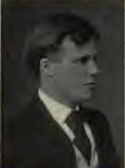
After graduating, W. Benjamin Fite stayed at Cornell as a graduate student in Mathematics. In 1901 he was awarded his Ph.D. supervised by George A. Miller. His dissertation was titled "On Metabelian Groups". He stayed at Cornell as an instructor and Assistant Professor and left for Columbia University in 1911. He succeeded Cornell faculty member John Henry Tanner as Treasurer for the American Mathematical Society and served in this role from 1921 to 1929. He retired in 1942 as the Davies Professor of Mathematics Emeritus.
Anna Mary Widman Ph.B. 1888
Widman was Fellow elect in Mathematics in 1888 but did not take the position. She taught mathematics at Ithaca High School 1889-92. In 1892 she married James Manning Bronson, later editor of the Syracuse Herald who died in 1905. After 1911, Widman was a librarian at Brown University. She died in 1947.
Georges Egbert Fisher AB 1887

After graduating, George Egbert Fisher stayed at Cornell as an Instructor in Mathematics until accepting a position of Assistant Professor at the University of Pennsylvania in 1889. There, he obtained his Ph.D. in Mathematics in 1895 with a dissertation titled "Some points in the theory of invariants and covariants", became Professor, served as Chair of Mathematics, and also served as Dean of the College between 1909 and 1912.
Arthur Rollin Harris Ph.B. 1885
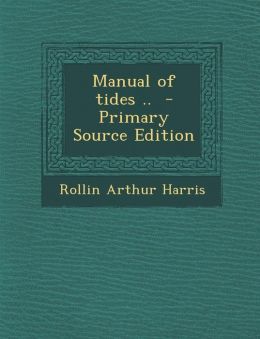
Arthur Harris graduated with Honors for General Excellence and Special Honors in Mathematics with a dissertation titled "The Theory of Projectiles in a Resisting Medium". He stayed at Cornell were he earned his Ph.D. in mathematics in 1888. His dissertation was on "The Theory of Images in the Representation of Functions" and it was probably directed by James McMahon. After graduating, he was a fellow at the newly created Clark University before going to an illustrious career in the Tidal Division of the US Coast and Geodesic Survey. At the time of his death in 1918, he was considered one of the world experts in tidal theory. In Harris' obituary in "Science", one reads Perhaps it may not be out of place here to quote the words of the eminent French Mathematician Henri Poincaré. In his "Mécanique Céleste" he subject various tidal theories to searching analysis and sum up by saying "It appears probable that the final theory will have to borrow from that of Harris a notable part of its essential features". Harris' brother (Gilbert Dennison) graduated from Cornell and returned later as Professor of Paleontology. One of his sisters, Florence Belle Flory Harris also graduated from Cornell, specializing in romance languages and teaching in New York, New Jersey and California.
Charlotte Smith Ph.B. 1885
Charlotte Smith taught mathematics at Bryn Mawr Preparatory School 1885-7, Washington (D. C.) High School 1887-91 and Girl's High School Brooklyn, New York.
Abram Rogers Bullis BS (Math) 1881, BCE '82
The only Chair Professorship devoted explicitly to Mathematics at Cornell is named after Abram Rogers Bullis. The following text is from the Bullis Book Chronicles (online): Abraham R. Bullis was the only one of Doctor Bullis' children to remain in Macedon. He was born on September 4, 1854 in Farmington, New York. At the age of eight, his mother died and he went to live with his grandfather at the old family homestead in Macedon. In later years, after attending Macedon Academy from 1868-1869, he taught for a few years in various district schools, including Macedon Union School. He left teaching to enter Cornell University. In 1881 he graduated with a degree in Mathematics and the following year received a degree in Civil Engineering. He was a very smart man and was offered many positions from various governments and colleges. Abe would not take the jobs, because it would take him away from Macedon. He worked as a surveyor in much of Wayne County and held many other important positions in the Macedon area.
Hiram John Messenger Ph.B. 1880
Messenger is best known as the Cornell trustee who instituted and funded the "Messenger Lectures". After graduating in 1880, he taught mathematics at Cortland Normal School (where he had been a student) and at Napa College, in California. In 1883, he returned to Cornell as a graduate student. He was a Fellow in Mathematics in 1885-86 and received his Ph.D. "Modern Methods in Geometric Conics" in 1886 under James Edward Oliver of whom he was the first Ph.D. student. From 1886 to 1890, Messenger was Acting Associate Professor of Mathematics at the University of the City of New York (NYU) and he was one of the first 16 members of the New York Mathematical Society (which later became the American Mathematical Society). In 1890-91, he was a student at the Institute of Actuaries in London. Upon his return to the United States, he worked for the Metropolitan Life Insurance Company and for the Travelers Insurance Company.
Lena Lillian (Hill) Severance BS (S-L) 1879
Of Lena Hill, the SUN wrote in 1885, on the day of her marriage to Frank Edward Severance '79, that she was remembered as "one of the brightest Lady students" at Cornell. After graduating with a Bachelor in Science and Letters in three years, she taught Mathematics and History at Omaha High School, 1879-84, and Mathematics in the Brearley School, New York City, 1884-5. Lena was a founder of the Association of Collegiate Alumnae (later the American Association of University Women). She later published a short book "The Theory of Equipotence: method of analytical geometry of Sig. Bellavitis" (1930). She was active in various education issues including the establishment of a pension system for teachers. Travelling with her husband, she crossed the Atlantic, Pacific and Indian oceans visiting Europe, Africa, Japan, India, Burmah and Java.
Arthur Stafford Hathaway, BS (Math), 1879
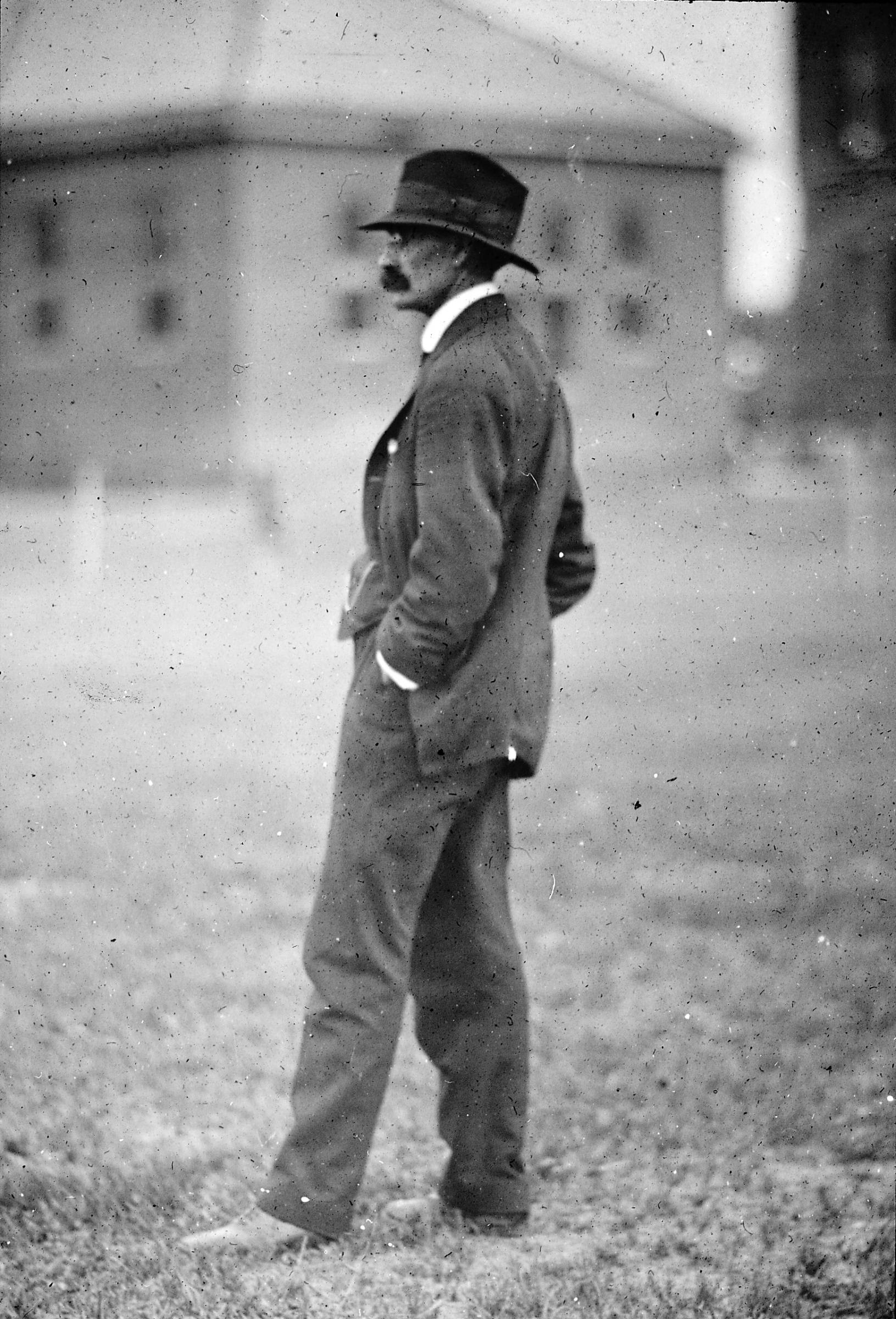
Hathaway is the first person to graduate BS with an explicit mention of Mathematics. After graduating from Cornell, Hathaway went to Baltimore to study Mathematics at John Hopkins with J. Sylvester. In 1878, he had married Susan Hoxie, a Cornell student and the first women member of the Cornell Agricultural Club. Susan and their son died in childbirth in 1880. The son was named Edward Oliver Hathaway (probably, after Professor James Edward Oliver, Chair of Mathematics at Cornell). In 1884, he attended lectures on "Molecular Dynamics and the Theory of Light" by William Thomson, Baron Kelvin, and made notes that served as the basis for "The Baltimore Lectures on Molecular Dynamics and the Theory of Light" , a monograph published by Lord Kelvin twenty years later in 1904. Despite excellent published work in number theory, Hathaway never defended his Ph.D. at Johns Hopkins. Instead, in 1885, he returned to Cornell where he was highly regarded and became Assistant Professor. He left in 1891 to become Professor and Head of Mathematics at the Rose Polytechnic Institute in Indiana where Henry T. Eddy, the first Cornell Ph.D., was president (the photo is from the time he was at Rose Polytechnics). He is the author of several books including " A Primer on Quaternions" (1896) and "A Primer of Calculus" (1901). He is also the author of some of the first mathematics research articles written by a Cornell student including two articles in the American Journal of Mathematics.
Charles Ambrose Van Velzer, BS, 1876
After graduating, Van Velzer served as Instructor in Mathematics at Cornell for two years before joining The Johns Hopkins University as a University Fellow to work with J.J. Sylvester. He stayed 3 years at Johns Hopkins but left without a Ph.D. when he was appointed Instructor of Mathematics at The University of Wisconsin at Madison in 1881. He was Chair of Mathematics at Madison between 1884 and 1894 and supervised the first two Mathematics Ph.D.s awarded by the University of Wisconsin (Stecker 1897 and Running 1899). He received an honorary Ph.D. from Hillsdale College in 1883. He left the University of Wisconsin in 1906 and later taught at Carthage College. Van Velzer is the author of a number of books, including "Plane and Solid Geometry: Suggestive Method" and "University Algebra", published by Tracy, Gibbs and Company. Universal Algebra was written as a textbook for Madison's first-year mathematics course.
Cornelia Alice Preston B.S. 1874
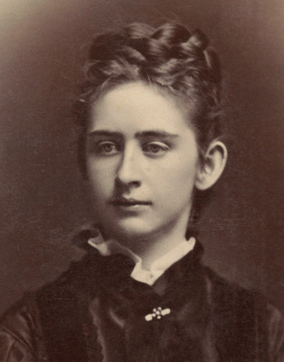
Cornelia Preston attended Vassar College for two years before enrolling at Cornell in 1872. After graduating in 1874, she taught Higher Mathematics and History in Utica. She married her classmate George B. Upham. In 1945, she was the oldest living Cornellian. She died in 1947 at the age of ninety-five.
George Tayloe Winston Lit.B, 1874

After graduating, George Winston stayed at Cornell as Instructor in Mathematics. The next year, he was Assistant Professor of Literature, University of North Carolina, and married Caroline S. Taylor, a fellow Cornell student. In 1891, he was elected president of the University of North Carolina at the age of thirty-nine. Invited to deliver the commencement address at UT Austin in June 1896, he so impressed the regents that they named him the first regular president of the institution. He left in 1899 to accept the presidency of the Agricultural and Mechanical College of North Carolina (now North Carolina State University).
Emma Sheffield Eastman Ph.B. 1873

Emma Eastman is the first woman to graduate from Cornell. She had studied at Vassar College and started attending lectures at Cornell in 1871. In 1873-74, she taught science and mathematics in High School in Portland, Maine. She married Leroy A. Foster and worked for women's suffrage for much of her life, dying in California in 1932.
Cornell Undergraduates who later joined the Cornell mathematics faculty
- Arthur Stafford Hathaway BS (Math) 1879, Assistant Professor 1885-91. Rose Polytechnic.
- John Henry Tanner BS 1881, Instructor, Assistant Professor 1894, Professor 1904-1926.
- William Benjamin Fite PhB 1892, PhD 1901, Instructor, Assistant Professor 1903-1911. Columbia.
- Vivian Streeter Lawrence ME, 1922, PhD 1933, Assistant Professor 1933-1940, Associate Professor 1940-1942. West Point.
- Carl Herz BA 1950 (President of the Math Club), Assistant, Associate, Full Professor 1953-1969. McGill.
- Jerome Sacks BA 1952, PhD 1956, Assistant Professor 1960-61, Duke and the National Institute of Statistical Sciences.
- George Stewart Rinehart BS (Math) 1958, Assistant, Associate Professor 1963-72. Died in an automobile accident.
- Gerald Enoch Sacks Electrical Eng. 1958, PhD 1961, Assistant Professor 1962-66. Harvard, MIT
- Stephen Gelbart BA 1967, Assistant, Associate, Full Professor 1971-85. Weizmann Institute
- Mark Gross BA (Math and CS) 1984, Assistant, Associate Professor 1993-98. Cambridge.
- Ravi Ramakrishna, BA (Math) 1988, Assistant, Associate, Full Professor, 1998-present